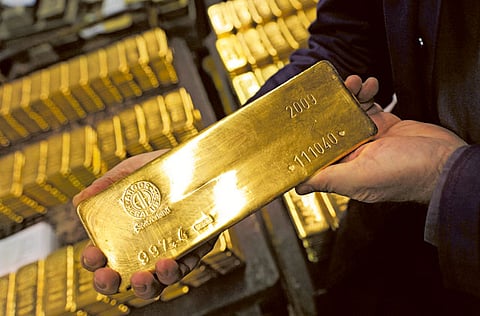Republican platform hints at reviving gold standard
Gold supplies may not match growth in monetary base, economists warn

Washington: A Republican Party call to study whether to return the US dollar to the gold standard drew scepticism from economists and industry experts.
The proposal is included in a draft platform to be submitted for approval by the Republican National Convention, which is scheduled to start on Monday in Tampa, Florida. It calls for a commission to study “possible ways to set a fixed value for the dollar” similar to one in the early 1980s that studied “the feasibility of a metallic basis for US currency.”
The commission appointed early in Ronald Reagan’s presidency “advised against such a move,” the draft noted. Economists and industry experts said it is either unlikely or inadvisable to revive the gold standard, which President Richard Nixon abandoned in the 1970s.
“A return to the gold standard is unlikely” because of “the inability to achieve widespread international agreement on the standard” as well as determining “what price to return to it at,” David Schraeder, a spokesman for the New York-based World Gold Council said in an email.
A “fundamental problem” is that that the growth of gold supplies “may not necessarily match the appropriate growth in the monetary base,” he said.
Obama’s wreckage
The platform statement said that three decades after the Reagan study, fresh consideration of the “feasibility of a metallic basis for US currency” is needed “as we face the task of cleaning up the wreckage” of President Barack Obama’s policies.
The statement was included along with a provision that advocates an annual audit of the Federal Reserve Board and the 12 regional reserve banks, including monetary policy decisions.
Both reflect campaign themes adopted by Texas Representative Ron Paul, who ran against Republican candidate Mitt Romney in the party’s presidential primary. Paul’s supporters have been threatening to instigate a floor fight if the platform wasn’t amended to reflect their views.
Romney said on Monday that “the Federal Reserve should be accountable” so he “would like to see the Fed audited” in a way that preserves its independence. He hasn’t endorsed legislation the House passed last month to have the Government Accountability Office, a watchdog of Congress, audit the Fed, including monetary policy deliberations.
Romney position
In addition, he distanced himself from a return to a gold standard in a CNBC interview in January.
“I know that in the past when we had a gold standard, the idea that somehow it was detached from or free from any interference by Congress was simply wrong because even with the gold standard, someone has to decide what is the conversion rate between gold and the dollar,” Romney said.
The platform draft pleased anti-tax Tea Party movement supporters who attended the platform hearings, and talk about a convention showdown has quieted among Paul’s supporters.
“We like the idea of looking at monetary policy and looking at what we call sound money,” Russ Walker, a vice president of FreedomWorks, a Washington-based umbrella group of the Tea Party movement and an Oregon delegate, said.
Panel leaders were careful not to endorse a return to the gold standard at an August 21 press conference in Tampa after the platform hearings were completed.
The gold-standard study was included “so we have some language for evaluation to make sure that we have a good, sound monetary policy,” North Dakota Senator John Hoeven, a co-chairman of the platform panel, said.
Better ways
John Taylor, one of 576 economists who endorsed Romney, said “there are better ways” to achieve economic stability than returning to the gold standard. Pegging the dollar to “a broad price index” would be preferable because it would be “more robust,” Taylor, a former Treasury undersecretary and a Stanford University professor, said in an interview on Bloomberg Radio.
“There’s no way in heck it’s going to happen,” Dave Lutz, head of exchange-traded fund trading and strategy at Baltimore-based Stifel Nicolaus & Co. Inc., said.
The nation would “have to figure out what percentage of our monetary base will be backed by gold and that’s a big question as far as the economic impact,” Lutz said.
A decision to back the dollar 100 per cent by gold “phased in over years” would create “a big economic contraction because you’ll have dollars coming out of circulation.”
The proposal “is primarily symbolic to demonstrate the desire of the Republican Party to be more fiscally responsible,” Philip Orlando, chief equity market strategist at Federated Investors Inc. in New York, said.
It represents the Republican attempt to “demonstrate to the electorate that we’re the party that’s concerned about trying to restore fiscal prudence,” Orlando said.



